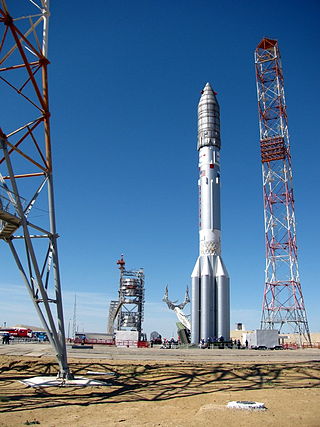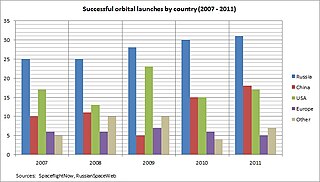A proton is a subatomic particle.
Contents
Proton may also refer to:
A proton is a subatomic particle.
Proton may also refer to:

A debit card, also known as a check card or bank card, is a payment card that can be used in place of cash to make purchases. The card usually consists of the bank's name, a card number, the cardholder's name, and an expiration date, on either the front or the back. Many new cards now have a chip on them, which allows people to use their card by touch (contactless), or by inserting the card and keying in a PIN as with swiping the magnetic stripe. Debit cards are similar to a credit card, but the money for the purchase must be in the cardholder's bank account at the time of the purchase and is immediately transferred directly from that account to the merchant's account to pay for the purchase.

Spacecraft propulsion is any method used to accelerate spacecraft and artificial satellites. In-space propulsion exclusively deals with propulsion systems used in the vacuum of space and should not be confused with space launch or atmospheric entry.

An ion thruster, ion drive, or ion engine is a form of electric propulsion used for spacecraft propulsion. An ion thruster creates a cloud of positive ions from a neutral gas by ionizing it to extract some electrons from its atoms. The ions are then accelerated using electricity to create thrust. Ion thrusters are categorized as either electrostatic or electromagnetic.

Proton is an expendable launch system used for both commercial and Russian government space launches. The first Proton rocket was launched in 1965. Modern versions of the launch system are still in use as of 2023, making it one of the most successful heavy boosters in the history of spaceflight. The components of all Protons are manufactured in the Khrunichev State Research and Production Space Center factory in Moscow and Chemical Automatics Design Bureau in Voronezh, then transported to the Baikonur Cosmodrome, where they are assembled at Site 91 to form the launch vehicle. Following payload integration, the rocket is then brought to the launch pad horizontally by rail, and raised into vertical position for launch.

A geostationary transfer orbit (GTO) or geosynchronous transfer orbit is a type of geocentric orbit. Satellites that are destined for geosynchronous (GSO) or geostationary orbit (GEO) are (almost) always put into a GTO as an intermediate step for reaching their final orbit.
A service module is a component of a crewed space capsule containing a variety of support systems used for spacecraft operations. Usually located in the uninhabited area of the spacecraft, the service module serves a storehouse of critical subsystems and supplies for the mission such as electrical systems, environmental control, and propellant tanks. The service module is jettisoned upon the completion of the mission, and usually burns up during atmospheric reentry.

A diver propulsion vehicle (DPV), also known as an underwater propulsion vehicle, sea scooter, underwater scooter, or swimmer delivery vehicle (SDV) by armed forces, is an item of diving equipment used by scuba divers to increase range underwater. Range is restricted by the amount of breathing gas that can be carried, the rate at which that breathing gas is consumed, and the battery power of the DPV. Time limits imposed on the diver by decompression requirements may also limit safe range in practice. DPVs have recreational, scientific and military applications.

Network for Electronic Transfers, colloquially known as NETS, is a Singaporean electronic payment service provider. Founded in 1986 by a consortium of local banks, it aims to establish the debit network and drive the adoption of electronic payments in Singapore. It is owned by DBS Bank, OCBC Bank and United Overseas Bank (UOB).

The Khrunichev State Research and Production Space Center is a Moscow-based manufacturer of spacecraft and space-launch systems, including the Proton and Rokot rockets, and the Russian modules of Mir and the International Space Station.

The Malaysian Electronic Payment System (MEPS) is an interbank network service provider in Malaysia. In August 2017, MEPS merged with Malaysian Electronic Clearing Corporation Sdn Bhd (MyClear) to form Payments Network Malaysia Sdn Bhd (PayNet).

Spacecraft electric propulsion is a type of spacecraft propulsion technique that uses electrostatic or electromagnetic fields to accelerate mass to high speed and thus generating thrust to modify the velocity of a spacecraft in orbit. The propulsion system is controlled by power electronics.

The Proton-M, (Протон-М) GRAU index 8K82M or 8K82KM, is an expendable Russian heavy-lift launch vehicle derived from the Soviet-developed Proton. It is built by Khrunichev, and launched from sites 81 and 200 at the Baikonur Cosmodrome in Kazakhstan. Commercial launches are marketed by International Launch Services (ILS), and generally use Site 200/39. The first Proton-M launch occurred on 7 April 2001.

Artemis was a geostationary earth orbit satellite (GEOS) for telecommunications, built by Alenia Spazio for ESA. The Artemis satellite operated at the 21.5E orbital position until 2016, when it was moved to 123E to cover the L-Band spectrum rights for Indonesia's Ministry of Defense.

Russia's space industry comprises more than 100 companies and employs 250,000 people. Most of the companies are descendants of Soviet design bureaux and state production companies. The industry entered a deep crisis following the dissolution of the Soviet Union, with its fullest effect occurring in the last years of the 1990s. Funding of the space program declined by 80% and the industry lost a large part of its work force before recovery began in the early 2000s. Many companies survived by creating joint-ventures with foreign firms and marketing their products abroad.

A space tug is a type of spacecraft used to transfer spaceborne cargo from one orbit to another orbit with different energy characteristics. The term can include expendable upper stages or spacecraft that are not necessarily a part of their launch vehicle. However, it can also refer to a spacecraft that transports payload already in space to another location in outer space, such as in the Space Transportation System concept. An example would be moving a spacecraft from a low Earth orbit (LEO) to a higher-energy orbit like a geostationary transfer orbit, a lunar transfer, or an escape trajectory.

Luch 5B is a Russian Luch relay satellite which transmits data from the Russian Orbital Segment of the International Space Station, and from other satellites in low Earth orbit. It is in geosynchronous orbit.

Luch 5A is a Russian Luch relay satellite which transmits data from the Russian Orbital Segment of the International Space Station, and from other satellites in low Earth orbit. It is in geosynchronous orbit.
AMC-9 is a commercial broadcast communications satellite owned by SES World Skies, part of SES S.A. Launched on 6 June 2003, from Baikonur Cosmodrome, Kazakhstan, on the 300th launch of a Proton family rocket, AMC-9 is a hybrid C-band / Ku-band satellite located at 83° West, covering Canada, United States, Mexico, and Caribbean. It is owned and operated by SES S.A., formerly SES Americom.
A thruster is a spacecraft propulsion device used for orbital station-keeping, attitude control, or long-duration, low-thrust acceleration, often as part of a reaction control system. A vernier thruster or gimbaled engine are particular cases used on launch vehicles where a secondary rocket engine or other high thrust device is used to control the attitude of the rocket, while the primary thrust engine is fixed to the rocket and supplies the principal amount of thrust.
NOAA-14, also known as NOAA-J before launch, was an American weather satellite operated by the National Oceanic and Atmospheric Administration (NOAA). NOAA-14 continued the third-generation operational, Polar Orbiting Environmental Satellite (POES) series operated by the National Environmental Satellite Service (NESS) of the National Oceanic and Atmospheric Administration (NOAA). NOAA-14 continued the series of Advanced TIROS-N (ATN) spacecraft begun with the launch of NOAA-8 (NOAA-E) in 1983.